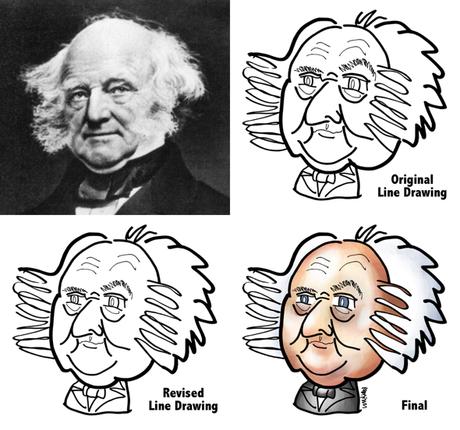



I had fun drawing his caricature, but he made me work for it. Here’s a condensed bio:

Born 1782. His dad owned a tavern near Albany, NY, that was frequented by big-name politicians like Alexander Hamilton and Aaron Burr. It gave Van Buren his first taste of politics. He became a lawyer and served two terms in the U.S. Senate.

He became an ally of Andrew Jackson and was Jackson’s running mate in the 1828 presidential election. They campaigned against the national bank, believing it was controlled by elites (merchants) at the expense of farmers. They won. Jackson killed off the national bank after they were reelected in 1832.

Van Buren ran for president in 1836 as Jackson’s hand-picked successor. He won, but The Panic of 1837 sent the country into a severe depression. His political opponents dubbed him “Martin Van Ruin.” He ran for reelection in 1840 and lost.

His anti-slavery views cost him the 1844 Democratic nomination (he opposed the annexation of Texas which would have added another slave state to the Union). He ran again in 1848 as a third party candidate opposed to slavery in new Western territories (he didn’t win any electoral votes). He lived to see the start of the Civil War and died in 1862.

Some thoughts:

1. Those whiskers. They look funny today, but they’re distinctive. You remember them, and you remember him. It points up the importance of visuals for brands.
2. Van Buren would have heard different views in his dad’s tavern. Opposing views. We need opposing views to see the big picture and get a better idea of the truth.

3. Having a patron (Jackson) is a huge advantage. You need allies. You need to build relationships.
4. Actions have unintended consequences. Jackson shut down the national bank and deposited federal monies in state banks.


5. Van Buren once wrote of himself: “I am timid in innovation.” He wasn’t a good crisis manager. He stuck with Jackson’s tight money policy (to combat inflation) and let banks and businesses fail. It deepened and prolonged the depression.

6. You can’t let others define your brand. During the 1840 campaign, Van Buren’s opponents portrayed him as an out-of-touch aristocrat, while portraying their candidate (William Henry Harrison) as a simple frontiersman.



